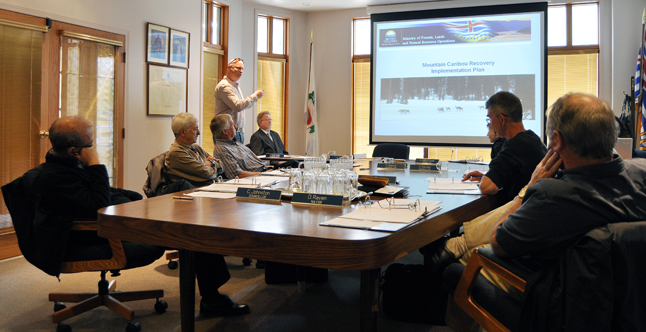
By David F. Rooney
Directors of the Revelstoke Snowmobile Club sat quietly in the gallery and listened while Mountain Caribou Recovery Coordinator Darcy Peel explained to Council why large areas of the backcountry were made off-limits to snowmobilers.
“These additional closures could be the straw that breaks the camel’s back here in Revelstoke,” fumed RSC Director Tom Dickson.
He said snowmobilers here have respected the caribou that still exist here and self-police themselves but the closures could be a blow to the snowmobiling sector.
Peel said two areas — Keystone and Standard Basin and Caribou Basin — are completely closed to winter use while a large portion of Frisby Ridge is also off limits, unless users acquire special permits. Caribou Basin may also be open to people with special permits. All three areas were closed two weeks ago. Violators will be ticketed, he told Council, which was meeting as the Committee of the Whole on Tuesday.
The closures are supposed to help the provincial government achieve six commitments it has made regarding the endangered mountain caribou. Those commitments are:
- habitat preservation;
- predator control, including a controversial wolf cull and a wolf sterilization program;
- prey control, including reductions in moose and deer populations;
- herd augmentation, which means transferring some caribou from one area to another to enlarge small herds;
- an adaptive management plan that permits flexible decision making; and
- controls on public and commercial recreational use of the backcountry.
The three areas that are now closed, or in the case of Frisby Ridge semi-closed, are part of a 77,000-hectare enlargement of the 380,000 hectares that are already closed to human use in order to protect these ungulates.
“We know this will have an impact but these are also a few of the remaining caribou areas,” Peel said.
The success or failure of these commitments will be overseen by a Progress Board composed of representatives from the government, the forest industry, the BC Snowmobile Federation, the Association of BC Snowmobile Clubs, First Nations, environmental groups and the commercial recreation sector.
The province will know by 2014 if its measures have halted the decline in mountain caribou numbers.



